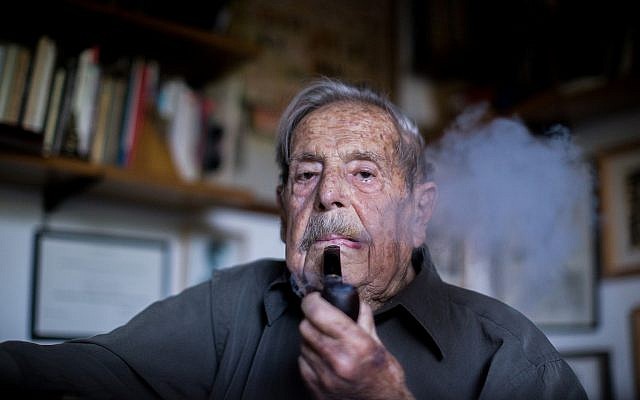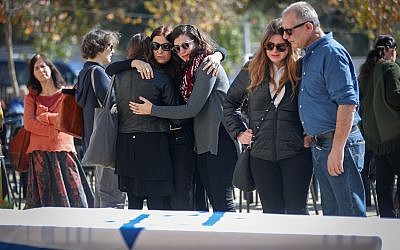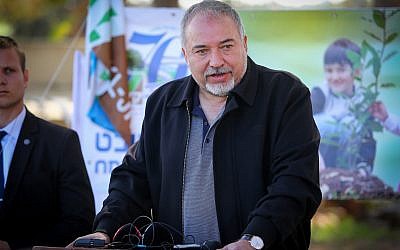 Remembering a warrior poet who embodied the Israeli experience
Remembering a warrior poet who embodied the Israeli experience
JOSHUA DAVIDOVICH
Haim Gouri is eulogized as the last of a generation, a fighter and writer who was able to speak to the nation but was also tarnished by his right-wing politics
 Veteran Israeli poet, novelist, journalist, and documentary filmmaker Haim Gouri at his home in Jerusalem, July 6, 2015. (Yonatan Sindel/Flash90)
Veteran Israeli poet, novelist, journalist, and documentary filmmaker Haim Gouri at his home in Jerusalem, July 6, 2015. (Yonatan Sindel/Flash90)
Haim Gouri was perhaps Israel’s best example of its unique brand of warrior-poets, birthed of a search for meaning through the fires of the Jewish people’s traumas and the country’s early wars.
It’s impossible to sum up the life of Gouri, a man of letters who in many ways embodied the competing personalities of Israel — fighters yearning for land but also peace — into a handful of pages, but a day after his death Wednesday, papers try their hand at remembering who he was and what he meant and encapsulating it into the format of a daily.
The tabloids Israel Hayom and Yedioth Ahronoth devote a combined dozen pages to Gouri, and through all the remembrances and eulogies there is also a profound sense of loss for a mythological Israel of yore he personified, as if he were the last living breath of those who built the country, especially those of the pre-state Palmach militia. Yedioth Ahronoth, which includes a caricature of him joining other poetic Palmach alums on a cloud, calls him “The last national poet” and Israel Hayom says he was “The last of the giants.”
Haaretz’s straight-up obituary of Gouri notes that “Gouri’s poems were the poems of the Israeli national ethos, and many of his poems became inalienable assets of Israeli culture.”
“Gouri was many things,” writes Nahum Barnea in Yedioth Ahronoth. “He was a gifted poet and artist, one of the most talented people of the ’48 generation; he was the flesh and blood of the state, loving and pained; he was an excellent journalist, curious, empathetic, who knew how to describe a scene or tell a story; he was a courageous fighter, moral, who knew who to act with humanity and charity toward a conquered population; he was a simple, humble and honest man of conscience.”
In Israel Hayom, Amnon Lord, who knew Gouri personally, adds a bit more color to his humble life, especially the mostly overlooked last chapters.
“Until his last month he would continue to climb the three stories to his modest apartment in the Jerusalem neighborhood of Talbieh. A home without an elevator. Alika, as he called his wife Aliza, would take care of him. Make sure he didn’t drink, or at least not too much, and didn’t get annoyed and come to blows with some annoying passerby who started to harass him for his political views,” he writes.
 Israelis mourn near the coffin carrying Israeli poet, novelist, journalist and filmmaker Haim Gouri, outside the Jerusalem theater on February 1, 2018. Gouri passed away yesterday. (Yonatan Sindel/Flash90)
Israelis mourn near the coffin carrying Israeli poet, novelist, journalist and filmmaker Haim Gouri, outside the Jerusalem theater on February 1, 2018. Gouri passed away yesterday. (Yonatan Sindel/Flash90)
In Yedioth, writer Amos Oz writes that Gouri’s right-wing politics indeed came between them “but we remained close friends.”
Yet those politics also lead to a rare bit of criticism of Gouri in Haaretz’s lead editorial.
“Gouri’s tragedy, like those of many of his generation, was the effort to straddle the fence, to shoot while crying, to be both moral and an occupier. Gouri called it ‘the third way.’ He belatedly realized that the settlers and right-wing governments were leading the state into moral disaster and undermining the democracy the founders established. But he didn’t succeed, or didn’t dare, to offer an alternative and to fight for it. The 1948 generation left that mission to its heirs,” the paper writes.
In Israel Hayom, writer A.B. Yehoshua also writes about Gouri’s politics, how he became a believer in the two-state solution after “he understood that keeping greater Israel meant apartheid for Arabs,” but he zeros in on Gouri’s work as a journalist able to put ideology to the side.
“His journalist’s instinct — to go into a place and bring the voice of people — gave great strength to his writing and his humanity,” he writes. “He could cross generational boundaries in a wonderful way, and was able to speak with those younger than him and older than him.”
In Yedioth, Eitan Haber focuses on Gouri’s fighter past, writing that his name should be inscribed on every military memorial in the country, as someone who was always with the IDF.
“Gouri was a national poet, who wrote his poetry with an iron pen. In a country whose years are rich with security operations, he was a symbol to those who followed after him in wars,” he writes.
There’s some actual news in the papers as well and Haaretz’s lead story previews what may be the next war, with a headline quoting Defense Minister Avigdor Liberman saying the next battle in the north “will need ground troops or will never end.”
 Defense Minister Avigdor Liberman during a ceremony for the Jewish holiday of Tu Bishvat in Kibbutz Kfar Aza, in southern Israel, January 31, 2018. (Flash90)
Defense Minister Avigdor Liberman during a ceremony for the Jewish holiday of Tu Bishvat in Kibbutz Kfar Aza, in southern Israel, January 31, 2018. (Flash90)
“No one is looking for adventures, but if we have no choice the goal is to end [the fighting] as quickly and as unequivocally as possible,” Liberman is quoted saying. “Regrettably, what we have in all the conflicts in the Middle East is that without soldiers on the ground it does not come to an end.”
Israel Hayom meanwhile looks at the country’s enemies in the south, after Hamas leader Ismail Haniyeh was placed on the US terror blacklist.
Columnist Eyal Zisser praises the move to the super moons and sees it as a sign of US President Donald Trump’s commitment to Israel.
“The message from Washington is clear: Haniyeh and Hamas are part of the problem and not the solution, and the Trump administration has no intention of ‘embracing’ Hamas to bring it into dialogue in the false hope that it will soften and give in,” he writes. “It’s also a message to Palestinian Authority President Mahmoud Abbas, who thought he could play with the Trump administration like he did with his predecessor in the White House, and who has tried to deal with Hamas via an intra-Palestinian reconciliation process instead of fighting them.”
Zawartość publikowanych artykułów i materiałów nie reprezentuje poglądów ani opinii Reunion’68,
ani też webmastera Blogu Reunion’68, chyba ze jest to wyraźnie zaznaczone.
Twoje uwagi, linki, własne artykuły lub wiadomości prześlij na adres:
webmaster@reunion68.com
